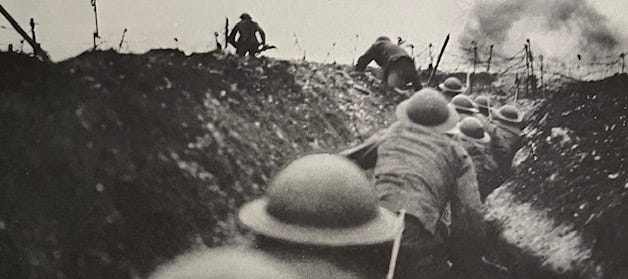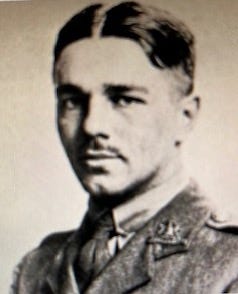An interview with the ghost of Great War poet Wilfred Owen
As the world teeters on the brink of a major conflict the combat veteran's spirit reveals what life - and death - is really like on the front line.
Recently I was joined in my History Explored studio by the spirit of the poet Wilfred Owen, who had agreed to be interviewed by me to talk about what he has called the Pity of War.
Wilfred, a British Army Second Lieutenant in World War 1, was killed in action on November 4 1918 in northern France – just one week before the war’s end. He was (and still is) aged 25. He ranks as one of the finest “war poets” in history.
You can find out more about him and explore his poetry here - https://www.poetryfoundation.org/poets/wilfred-owen
Here is our “interview” …
DM: Wilfred, right now geopolitical tensions are running high. Russia and Ukraine are locked in a terrible war that’s already claimed many thousands of lives; a bitter and deadly conflict rages in the Middle East; and meanwhile a long-running dispute involving China and Taiwan continues to simmer.
Some people are concerned that another World War may be looming. And recently a senior British Army officer floated the idea that nations may need to introduce conscription in order to boost the size of their armies in readiness for war.
My first question is - drawing on your experience can you give us some sense of what it’s like for soldiers on the battlefield?
WO: Our brains ache, in the merciless iced east winds that knife us …
Low drooping flares confuse our memory of the salient …
What are we doing here?
The poignant misery of dawn begins to grow …
We only know war lasts, rain soaks, and clouds sag stormy … Sudden successive flights of bullets streak the silence.
DM: Wilfred, I believe you once were caught up in a poison gas attack. Can you tell us something about that experience?
WO: Yes, David. It was like this:
Men marched asleep. Many had lost their boots,
But limped on, blood-shod. All went lame, all blind;
Drunk with fatigue; deaf even to the hoots
Of gas-shells dropping softly behind.
Gas! GAS! Quick, boys!–An ecstasy of fumbling
Fitting the clumsy helmets just in time,
But someone still was yelling out and stumbling
And flound’ring like a man in fire or lime.–
Dim through the misty panes and thick green light,
As under a green sea, I saw him drowning.
In all my dreams before my helpless sight
He plunges at me, guttering, choking, drowning.
DM: Wilfred, some people might say that this is the price of defending one’s country if and when it is under attack. Isn’t it right that citizens of a country should be patriotic, ready to die for their nation?
WO: My reply to that David is this –
If in some smothering dreams, you too could pace
Behind the wagon that we flung him in,
And watch the white eyes writhing in his face,
His hanging face, like a devil’s sick of sin,
If you could hear, at every jolt, the blood
Come gargling from the froth-corrupted lungs
Bitter as the cud
Of vile, incurable sores on innocent tongues,–
My friend, you would not tell with such high zest
To children ardent for some desperate glory,
The old Lie: Dulce et decorum est
Pro patria mori.
(DM: The Latin means ‘It is sweet and noble to die for one’s country’ from the poem by the Roman poet Horace)
DM: Wilfred, I hope this is not too painful for you – if you can, would you tell us what it was like on that day you were shot and killed?
WO: Yes David, well it was like this …
It seemed that out of battle I escaped
Down some profound dull tunnel, long since scooped
Through granites which titanic wars had groined.
Yet also there encumbered sleepers groaned,
Too fast in thought or death to be bestirred.
Then, as I probed them, one sprang up, and stared
With piteous recognition in fixed eyes,
Lifting distressful hands, as if to bless.
And by his smile, I knew that sullen hall,
By his dead smile I knew we stood in Hell.
DM: War is about death and killing, and it’s also about injury and disablement. Have you any examples of how a war-inflicted injury can impact someone’s life?
WO: Yes David, let me tell you about a man …
He sat in a wheeled chair, waiting for dark,
And shivered in his ghastly suit of grey,
Legless, sewn short at elbow. Through the park
Voices of boys rang saddening like a hymn,
Voices of play and pleasure after day,
Till gathering sleep had mothered them from him.
About this time Town used to swing so gay
When glow-lamps budded in the light blue trees,
And girls glanced lovelier as the air grew dim,-
In the old times, before he threw away his knees.
Now he will never feel again how slim
Girls’ waists are, or how warm their subtle hands.
DM: Wilfred, we know war is not all blazing action … what’s it like for soldiers in the periods between battles, say in the midst of a cold winter?
WO: Our brains ache, in the merciless iced east winds that knife us …
Wearied we keep awake because the night is silent …
Low drooping flares confuse our memory of the salient …
Worried by silence, sentries whisper, curious, nervous,
But nothing happens …
… What are we doing here?
The poignant misery of dawn begins to grow …
We only know war lasts, rain soaks, and clouds sag stormy.
DM: So Wilfred, can you give us an example of what is it like when troops have to advance on enemy positions?
WO: Yes David, just imagine a group of soldiers advancing to battle …
So, soon they topped the hill, and raced together
Over an open stretch of herb and heather
Exposed. And instantly the whole sky burned
With fury against them; and soft sudden cups
Opened in thousands for their blood; and the green slopes
Chasmed and steepened sheer to infinite space.
Of them who running on that last high place
Leapt to swift unseen bullets, or went up
On the hot blast and fury of hell’s upsurge,
Or plunged and fell away past this world’s verge,
Some say God caught them even before they fell.
DM: Wilfred, do you recall any of the last words of comrades killed in battle.
WO: Indeed I do David. I’ll give you just three examples…
‘O Jesus Christ! I’m hit,’ he said; and died.
Whether he vainly cursed or prayed indeed,
The Bullets chirped—In vain, vain, vain!
Machine-guns chuckled—Tut-tut! Tut-tut!
And the Big Gun guffawed.
Another sighed,—‘O Mother,—mother,—Dad!’
Then smiled at nothing, childlike, being dead ...
‘My Love!’ one moaned. Love-languid seemed his mood,
Till slowly lowered, his whole face kissed the mud.
DM: What is your core concern regarding war?
WO: … the truth untold,
The pity of war, the pity war distilled.
Now men will go content with what we spoiled.
Or, discontent, boil bloody, and be spilled …
WO: I’d like to finish with some words from my fellow World War 1 poet-spirit Rupert Brooke on the fate of so many young people caught up in war:
… Dawn was theirs,
And sunset, and the colours of the earth.
These had seen movement, and heard music; known
Slumber and waking; loved; gone proudly friended;
Felt the quick stir of wonder; sat alone;
Touched flowers and furs and cheeks. All this is ended.
DM: Thank-you Wilfred.
‘Interview’ taken from Wilfred’s poems -
Insensibility
Anthem For Doomed Youth
Disabled
Dulce et Decorum Est
Conscious
Exposure
Strange meeting
Spring Offensive
The Next War
A Terre




